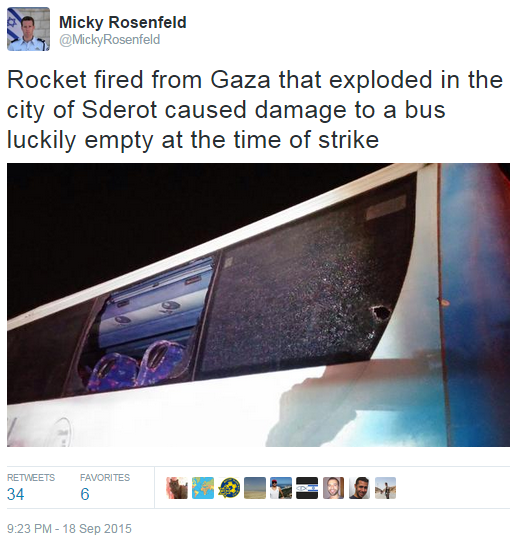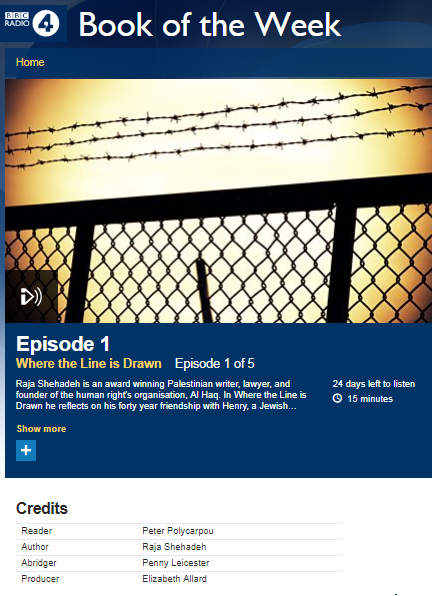We have previously discussed two aspects of a response received by a reader from the BBC Complaints department here and here.
The third (and final, readers will no doubt be relieved to know) part of that response related to the issue of the BBC’s reporting of casualty figures in the Gaza Strip during the recent conflict.
“We dispute the suggestion that using numbers provided by the Palestinian Health Ministry in Gaza and the UN on the death toll in Gaza indicates a pro-Palestinian bias.
The Health Ministry in Gaza is in touch with all the hospitals in Gaza. The Ministry is where all deaths are registered. It is the key source of information on deaths in the conflict for all news organisations and for other external organisations, including foreign embassies. Israeli authorities simply do not have access to hospitals and morgues in Gaza to provide such reporting. When the BBC reports death tolls they are clearly attributed to the Health Ministry, so the source has been clear in our coverage. Generally, during the conflict the Health Ministry itself did not make claims as to what number of those killed were civilians or combatants. They were collating information coming in from their morgues and passing on quickly to the media a number of times each day.
The UN has made claims as to the number of Palestinians killed and the number of those who are civilians. The BBC reports these numbers attributed to the UN which is of course an internationally recognised organisation. The UN has a large staff in Gaza who compile these reports. The question of who has officials in Gaza collating such reports is important. Some Palestinians were killed by Israeli air strikes when the IDF would have had surveillance of the aftermath of the strike from the air. However, many people have been killed by sustained artillery assault on certain areas which caused death from shrapnel fire, buildings collapsing and other factors. The BBC’s approach to reporting these numbers is common to the rest of the media.
We have, however, at a number of stages during the conflict broadcast interviews with Israeli officials who questioned the accuracy of the UN figures produced, and suggested that in future they may be revised downwards as has sometimes happened in previous conflicts. It’s also worth noting that Israel has not provided evidence as to why their figures on civilian casualties differed so significantly from the figures produced by UN officials on the ground in Gaza.”
The claim that “[w]hen the BBC reports death tolls they are clearly attributed to the Health Ministry, so the source has been clear in our coverage” is true in so far as it goes. However, those reports consistently failed to sufficiently clarify to BBC audiences that “the Health Ministry” is run by the same terrorist organization engaged in conflict with Israel and hence not an impartial or reliable source.
The claim that “[g]enerally, during the conflict the Health Ministry itself did not make claims as to what number of those killed were civilians or combatants” avoids recognition of the fact that the Gaza Health Ministry’s policy of identifying all casualties as civilians was a deliberate one designed to influence public opinion. Throughout its reporting on the conflict the BBC refrained from informing audiences of the very relevant issue of the instructions put out by Hamas’ Interior Ministry specifically ordering all parties to describe all casualties as ‘civilians’. The BBC also adopted the Hamas stance according to which all casualties were the result of Israeli actions and consistently ignored issues such as casualties resulting from misfired missiles or booby-trapped buildings.
The statement “[t]he UN has made claims as to the number of Palestinians killed and the number of those who are civilians. The BBC reports these numbers attributed to the UN which is of course an internationally recognised organization” clearly indicates that the BBC not only ignores the very relevant topic of the bias of UN bodies themselves, but also the political motivations of the sources of the figures quoted by the UN.
As was noted here at the time, UN statistics were compiled from a variety of primary and secondary sources and the BBC’s claim that “[t]he UN has a large staff in Gaza who compile these reports” is not supported by the information BBC Watch received from the UN itself.
“Katleen Maes informed us that UN OCHA’s three primary sources are B’Tselem, the PCHR and Al Mezan – all of which are political NGOs with a less than pristine record on impartiality in Israel-related matters. Maes added that the secondary sources used by UN OCHA to arrive at its 77% civilian casualty rate figures are the Hamas-run health ministry in Gaza, the Palestinian Red Crescent and the local Arabic media in Gaza, some of which is also run by Hamas and with the rest operating with Hamas consent, of course.”
The statement “[t]he question of who has officials in Gaza collating such reports is important” is undoubtedly true – although not in the manner intended in this response. The fact that the UN relies on local NGOs concurrently engaged in lawfare against Israel is a highly relevant factor in the assessment of the reliability of those claims.
Notably, this response completely avoids the topic of the BBC’s failure to independently verify the statistics it quoted and promoted and the fact that at no point did the BBC attempt to put the figures it quoted into their correct context.
The response states:
“The BBC’s approach to reporting these numbers is common to the rest of the media.”
“The rest of the media”, however, is not bound by the same editorial guidelines on accuracy and impartiality relevant to BBC coverage.
The statement “[i]t’s also worth noting that Israel has not provided evidence as to why their figures on civilian casualties differed so significantly from the figures produced by UN officials on the ground in Gaza” is particularly interesting in light of the fact that the BBC has made no such demand for “evidence” from the Hamas Health Ministry or the political NGOs which supply figures to the UN.
As the work of the Meir Amit Intelligence and Information Centre has shown, examination of the lists of names provided by those bodies reveals instances in which names were recorded more than once and cases in which the ages of casualties were misrepresented. As ‘Elder of Ziyon’ has demonstrated, many of those described by sources used by the BBC (particularly the PCHR) as ‘civilian casualties’ have turned out to be terrorists.
This response from the BBC Complaints department is clearly also unsatisfactory in that it completely fails to acknowledge the very relevant topic of manipulation of civilian casualty figures by Hamas and its supporters as part of their propaganda war aimed at garnering Western public opinion. The BBC’s promotion and amplification of Hamas-supplied figures, its failure to independently verify casualty statistics and civilian/combatant ratios and its documented capitulation to political pressure from interested parties on the topic of casualty figures is all evidence of its adoption of a specific politically motivated narrative.
No wonder, therefore, that complaints have been made on this subject but – as is amply clear from the official response above – the self-regulating BBC is incapable of providing an appropriately impartial response to complaints from its funding public, resorting instead to attempted self-justification of its editorial policies.




